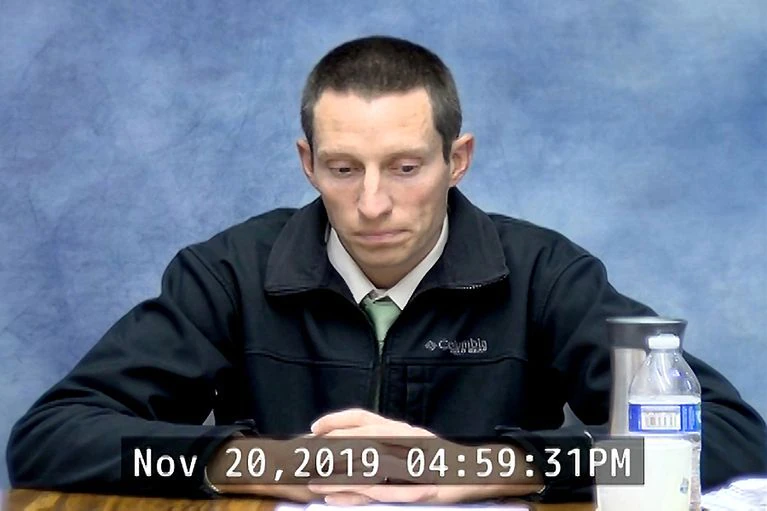
A former Oregon correctional nurse was sentenced to 30 years in prison Tuesday for sexually assaulting numerous women at the state’s only prison for women. Federal prosecutors say it’s the largest case of its kind the U.S. Department of Justice has prosecuted, both in terms of the number of victims and charges.
In July, a federal jury convicted Tony Klein of sexually abusing nine women at the Coffee Creek Correctional Facility in Wilsonville. Klein worked at the facility from 2010 until late 2017. Federal prosecutors say the sexual abuse began as early as 2013 or 2014.
Klein, 39, was also convicted of lying about the incidents under oath.
“While employed at Coffee Creek, the defendant was a sexual predator in a lab coat, with access to some of Oregon’s most powerless women,” federal prosecutors stated in court records. “He moved freely in a facility where his victims’ movements were constrained. He brazenly violated the law in the very place that his victims were being held accountable for their own crimes. And he acted with the certainty that even if any victim dared report his sexual misconduct, they would not be believed — because they were inmates and he was a member of the staff.”
During the criminal trial in Portland in July, 17 women told jurors that Klein touched them inappropriately during medical appointments or as they worked as orderlies cleaning the prison infirmary.
Some testified that Klein forced sex upon them despite their protests. Others said they believed they could face discipline if they refused his advances.
At Tuesday’s sentencing hearing, Lisa Whipple, who says Klein sexually assaulted her in prison, looked directly at him as she read a statement. Klein, seated in a light tan jail shirt, sat between his two defense attorneys. At times he looked back at Whipple, before looking away.
“That’s what bad decisions brings us: concrete, bars and bad food,” Whipple said. “I hope prison is as good to you as you were to it.”
Other victims spoke about the effect Klein’s abuse had on their mental health and their ability to develop positive relationships with other people or medical providers.
U.S. District Court Judge Michael Simon told Klein it was clear he had hurt many. After the victims spoke, Simon said there was little he could add.
“I cannot do any better job articulating the harm your actions caused,” Simon said. “I won’t even try.”
Klein hardly spoke during the hearing. At one point, Simon turned to Klein: “Do you understand that you have the right to speak now?”
“Yes,” Klein said, nodding his head.
Federal prosecutors recommended Klein receive 41 years in prison.
Cameron Bell, a trial attorney in the civil rights division at the U.S. Department of Justice, told the judge that Klein sexually abused women at Coffee Creek for years.
“We may never know the full extent of his victims,” Bell said.
Klein’s defense attorneys recommended he receive a sentence of 25 years in prison. They also noted in their sentencing memo and in court Tuesday that they believe Klein is innocent.
“We certainly accept the jury’s verdict,” Matthew McHenry, one of Klein’s attorneys, told the judge. “We also respectfully disagree with that verdict.”
Simon’s courtroom was packed for Tuesday’s sentencing.
McHenry told the the judge that roughly half of the people there were supporters of Klein. Since the verdict, he said, Klein has received an outpouring of support from members of his church and community. McHenry turned to the gallery and spoke to Klein’s friends and family: “He is grateful for your love and support.”
The judge said he accepted that Klein was not a “bad person” with his family members and his community. But Simon said Klein appeared to be a different person at work, with vulnerable people.
“You’re two different people,” he said.
Klein will be turned over to the U.S. Bureau of Prisons. He’s requested to serve his 30-year prison sentence in Indiana, Oregon or California.
Gavin Bruce, an assistant U.S. attorney in Oregon who was one of the federal prosecutors on the case, said Klein “attacked and abused” a vulnerable population. Bruce said one of the hardest parts of the investigation was gaining the trust of those women who were sexually abused by Klein while serving their own prison sentences.
“They’re being put into an interview room with the FBI, with a U.S. attorney, and being asked to retell a really traumatizing event — and they’re being asked to trust us,” Bruce told OPB after Klein was sentenced. “They haven’t had good experiences with law enforcement in the past. In this case, they didn’t have a great experience with an authority figure at the prison. In fact, they were abused and assaulted by that person.”
Bruce said the sentence Klein received was the culmination of years of work, even though he said Klein has “not accepted responsibility” and instead “buried his head in the sand.”
The FBI and the U.S. Department of Justice took over the case after the Washington County District Attorney’s Office declined to prosecute the case in 2018, following an investigation by Oregon State Police. The state has also paid out $1.87 million to resolve civil cases filed against the Oregon Department of Corrections over Klein’s conduct towards women at Coffee Creek.
“He was this apex predator, in a state prison medical uniform, and he almost got away with it,” Kieran Ramsey, the special agent in charge of the FBI in Oregon, told OPB following the hearing.
Ramsey credited the victims for continuing to come forward, as well as his colleagues in federal law enforcement for taking on a challenging case.
“Thirty years is a long hit,” Ramsey said. “I will leave it to the victims to find whether that is satisfactory in their eyes, but 30 years in federal prison is a long, long, long time.”
This article was originally published by Oregon Public Broadcasting.